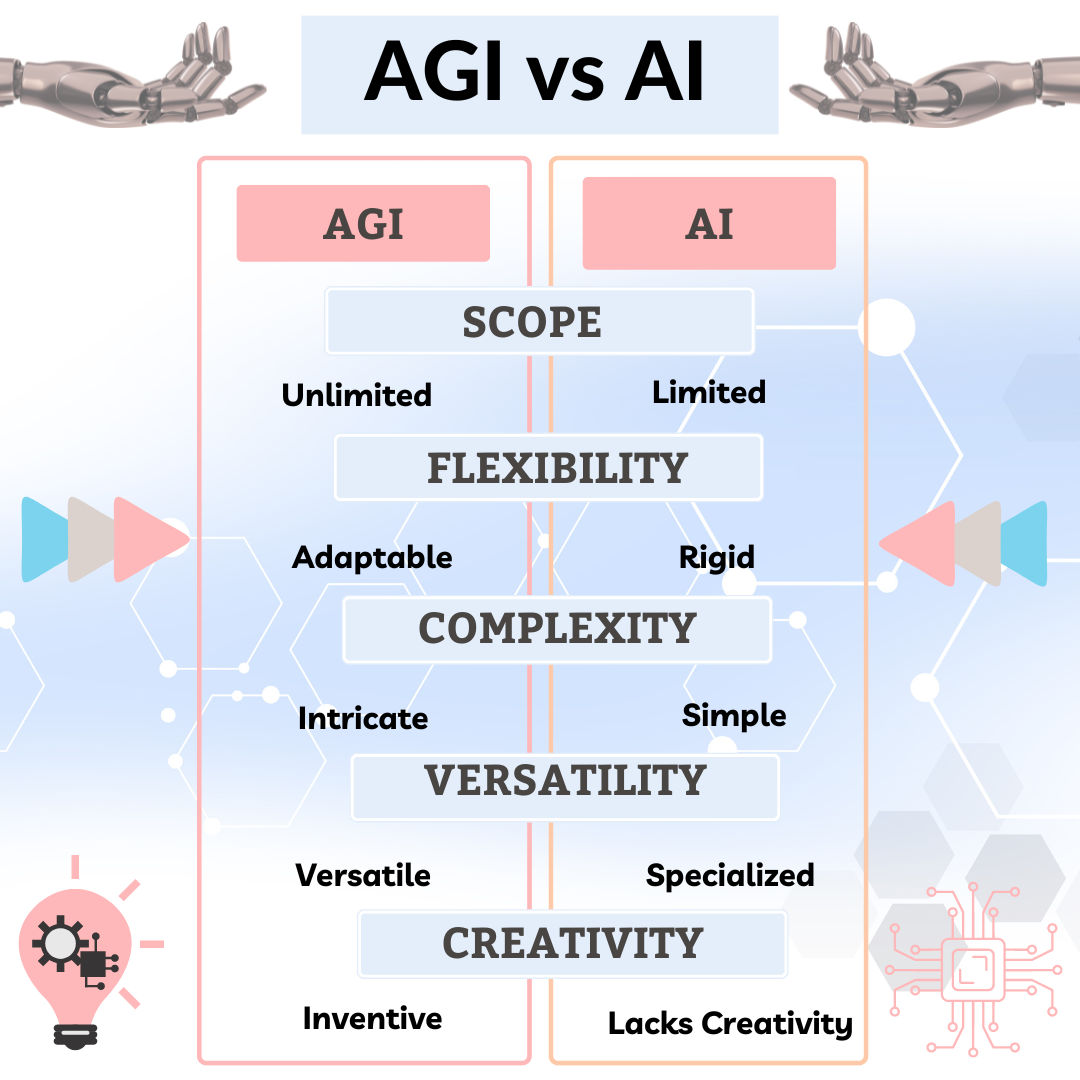AGI Unleashed: Reshaping Industries for Limitless Possibilities

We live in a world where technology is moving at breakneck speed, with AI and digitization leading the charge. Just when we thought we had seen it all, along comes Artificial General Intelligence AGI - the new kid on the block, set to take things up a notch. But have you ever pondered what AGI is and how does it differ from AI?
AI is poised for a remarkable journey of progress as it continues to reshape sectors. As per a Forbes article, Grand View Research's esteemed analysts predict that from 2023 to 2030, AI will grow at an astounding annual rate of 37.3%. These astounding figures paint a vivid picture of AI's boundless potential and far-reaching impact on our future. Sounds cool! Right?
AGI is somewhat of a jack of all trades in the area of Artificial Intelligence. It is made to carry out various intellectual tasks in a manner similar to how individuals do. This means that it has the potential to transform a wide range of industries, including finance, healthcare, transportation, and more. With the advent of AGI, these industries should see previously unprecedented levels of inventiveness, precision, and efficiency. According to the adage, "there's a new sheriff in town", and in the field of AI, that sheriff is AGI.
The distinction between AGI and AI must now be questioned, therefore, let's look at it! Are they identical or completely dissimilar?
Artificial General Intelligence (AGI) VS Artificial Intelligence (AI)
In the realm of artificial intelligence, a remarkable distinction unfolds, where two acronyms reveal contrasting marvels. AI, standing for "Artificial Intelligence," embodies machines adept at accomplishing specific tasks with finesse. Yet, AGI, the captivating abbreviation for "Artificial General Intelligence," unveils a world where machines transcend boundaries, comprehending and conquering any intellectual task known to humanity. AGI possesses the awe-inspiring ability to fathom, learn, and adapt, mirroring the intricate workings of our own minds. As AI unlocks doors to efficiency, AGI unlocks the essence of our cognitive prowess, inviting us into a future where machines become our intellectual equals.
As mentioned above, AGI can be considered the all-rounder of the AI world; however, a few differences exist between the two, such as:

Limited VS Unlimited
AGI aims to create machines that can perform a broad range of intellectual tasks, similar to human beings. Conversely, AI typically focuses on creating machines that can perform specific tasks, such as image recognition or natural language processing. Although there are many advantages of AGI over AI, there still exist some pros and cons between the two, such as AGI can handle a broad spectrum of intellectual tasks similar to humans.
In contrast, AI systems are typically designed for narrow domains, needing more broad understanding and adaptability of AGI.
Adaptability VS Rigidity:
Because its design objective is to imitate human intelligence and have a wide variety of intellectual talents, AGI is adaptive. It seeks to comprehend, pick up on, and adjust to new circumstances and responsibilities, much like how people may overcome numerous difficulties and transfer between diverse fields.
In contrast to AGI, AI is frequently developed to be exceptional at a particular activity and is trained on vast datasets, such as photo categorization or language translation.
Intricate VS Simple:
AGI is more ambitious and complex than AI, and developing AGI requires significant advancements in computer science, cognitive psychology, and neuroscience. It entails creating algorithms and models that can comprehend context, reason, pick up new information, and generalize knowledge across several domains.
Contrarily, AI uses more straightforward methods and techniques adapted to the specific application, focusing on specific tasks or challenges, leading to a more robust and simplified approach. AGI is complex because it aspires to replicate the complete range of human cognitive capacities, whereas AI is created to solve specific problems quickly and effectively.
Versatile VS Specialized:
AGI aims toward autonomous decision-making, allowing machines to think, plan, and decide for themselves. Whereas the need for explicit programming or rule-based instructions frequently constrains conventional AI's decision-making autonomy.
While AI is focused, concentrating on particular domains or activities, AGI is versatile, seeking to perform a wide range of intellectual tasks. While AI excels within its boundaries, AGI aims to imitate the versatility of human intelligence.
Inventive VS Creativity:
Unlike AI, which only handles particular problem areas and hence has the same depth of problem-solving capabilities as its more confined cousin, AGI is intended to demonstrate universal problem-solving abilities, control a range of complicated tasks, and adapt to new difficulties. AGI is creative because it aspires to imitate human creativity, giving robots the ability to come up with new ideas, think creatively, and venture into unknown territory.
AI, on the other hand, requires more creativity because it is programmed to adhere to preset rules and patterns, optimizing performance within narrowly specified tasks without the capacity for abstract thought or the generation of novel ideas.
These are just a few fundamental differences; have you ever wondered how AGI has redefined industries? If not, then keep on reading!
How has AGI redefined industries?
Generative AI can boost effectiveness and productivity, cut costs, and provide new growth prospects by making it possible to automate numerous jobs that individuals previously performed. Just as the invention of light bulbs and the emergence of the World Wide Web shaped history, the rapid development of Artificial General Intelligence (AGI) presents a similar transformative potential for society. While initial skepticism and doubt surrounded these groundbreaking discoveries, they ultimately revolutionized human efficiency and spurred innovation. AGI now stands on the threshold of similar revolutionary impact, promising a future where boundaries are shattered and possibilities abound.
For instance, Respiro is an innovative treatment for respiratory conditions, not just an ordinary inhaler. It goes above and beyond simple treatment by recording tailored data with every breath by utilizing the capabilities of Arm-powered machine learning sensors. Patients and healthcare professionals alike can benefit from this priceless knowledge, which offers insights that improve condition management. Respiro lays the door for a new era of individualized treatment by enabling the application of these state-of-the-art machine learning algorithms across a variety of disciplines. Now, envision the possibilities of AGI taking Respiro's capabilities to unprecedented heights. AGI could go beyond the limitations of conventional medical analysis thanks to its unmatched capacity for comprehension and learning.

#Healthcare
AGI has completely changed the way that patient care, research, and diagnostics are done in the healthcare sector. Healthcare workers can increase the precision and effectiveness of illness diagnosis using medical images such as X-rays, MRIs, and CT scans by utilizing AGI's superior pattern recognition and data processing capabilities. Researchers will be able to evaluate a sizable amount of patient outcome data using AGI to pinpoint drugs that are more likely to be effective against particular diseases. The market for AI in healthcare was estimated to be worth $2.4 billion in 2019 and is expected to grow to $31.02 billion by 2025.
#FinTech
The financial sector has undergone a change because of AI and fintech, which have made it possible for creative solutions like chatbots, robo-advisors, fraud detection systems, and more. AI chatbots are leading the way in customer care. AGI's capacity to analyze enormous volumes of data, spot patterns, and adjust to changing fraud tactics has greatly improved fraud detection capabilities. An article claims that the market for AI in FinTech would expand at a CAGR of 28.6% and reach $31.71 billion in 2027. Have you heard of the saying, "Work smarter, not harder," because this is what Artificial General Intelligence (AGI) seeks to achieve since it has the potential to automate a wide range of jobs, from the simple to the complicated, opening the door for improved productivity and efficiency in a variety of industries.
#Education
Artificial intelligence can address some of the significant issues in education today, revolutionize teaching and learning methods, and hasten SDG 4. Quick technological advancements unavoidably bring on many risks and issues, but they have surpassed regulatory structures and policy discussions. The Education 2030 Agenda can be achieved with the help of AI technologies, and UNESCO is committed to assisting Member States in doing so while ensuring that the fundamental values of inclusion and equal opportunity govern its use in educational contexts. In addition, AGI can significantly improve educational tools, personalize learning experiences, and offer intelligent tutoring. The education industry may provide pupils with more individualized, interesting, and successful learning experiences by utilizing AGI's capabilities.
#Ecommerce
By boosting consumer experiences, enhancing product recommendations, streamlining supply chain operations, and optimizing pricing tactics, AGI has the potential to completely transform the ecommerce sector. To enhance their analytical insights, tailor the customer experience, and boost their competitiveness, e-commerce firms are increasingly turning to artificial intelligence. Any company that doesn't invest in the promise of artificial intelligence in e-commerce will fall behind as the market for it expands. According to a survey conducted in October 2020, 70% of North American and European e-commerce decision-makers said AI would aid personalization in their companies' operations in 2021. In addition, 54% of the CEOs polled expressed optimism that AI would facilitate site searches. Only 4% of respondents said they did not believe AI will benefit their business.
Conclusion
AGI will transform the tech industry and empower businesses to provide individualized experiences, streamline operations, and strengthen customer relationships.
So, are you ready to take this opportunity to grow your business as a brand? With AGI at your disposal, there are countless opportunities for growth and creativity. "Strike while the iron is hot,” as they say; this is the ideal time to embrace change and advance your company.